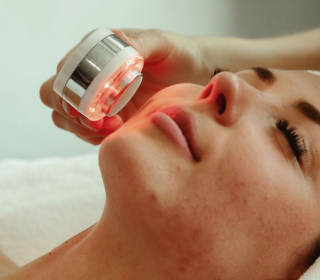Revitalizing April Recipe: Nourishing Pomegranate Face Mask

Pomegranates are an amazing superfood that your skin and body will love. Una Jefford has another recipe for anti-ageing, a pomegranate mask.
The last week of Anti-Ageing Month is here and we’ll be focusing on two recipes that will help us improve our skin by using the natural superfood, pomegranate.
Every day, we are exposed to 126 different chemicals in grooming products, from shampoo, toothpaste, and body wash to deodorant, creams, and hair products.
Through our skin, these chemicals can enter our bloodstream and bodies.
Una Jefford, Harley Street resident skin expert from Dermal Health has directed your attention to natural, affordable ingredients that are food-based, beauty superstars you can find in your kitchen.
Refine: Pomegranate Face Mask
You can create these products at home and share your experience by using the hashtags #antiageingapril, #HealthistaTV or #dermalhealth.
Three tablespoons of yogurt and a half cup of pomegranate seed powder can be blended together to form a paste.
It is easy to make this beautiful face pack at home. Apply it for 20 minutes, or until it dries. Then wash it off. It can be applied twice a week.
This simple face pack not only makes your skin softer and firmer, but it also reduces marks and blemishes. This face pack is great for all types of skin, but especially for those with fine lines, blemishes or dull complexions.
Why are pomegranates good for our skin?
It is not new to use pomegranate on our skin. It has been used in ancient Persia, now Iran, and Greece.
In 1600 BC, the pomegranate fruit was a must-have in Egypt’s palaces. This shows how valuable it was as a source of food.
In many Egyptian paintings, it is shown as a jewel-like fruit. This delicious red fruit has also been used for medicinal purposes.
Pomegranates have been known to boost collagen and promote firm, smooth skin.
Pomegranate fruit is rich in polyphenols such as anthocyanins and ellagic acids. It also contains minerals, fibres, vitamins A, C, E and folic.
This is why pomegranates are so powerful and considered superfoods.
Pomegranates have been shown to improve the appearance of skin by increasing collagen and elastin.
Vitamin C is essential for collagen production, which means that pomegranates help to produce half our daily Vitamin C requirements.

Vitamin C also helps to repair skin damaged by environmental factors, such as UV radiation.
It also protects the skin from sun damage, which can cause fine lines and wrinkles. Pomegranates can also prevent hyperpigmentation and age spots, as well as acne scars and acne. They also aid in wound healing, tissue regeneration and cell renewal.
What can’t pomegranates do?
Pomegranate is able to penetrate deep into the skin and works with most skin types. It does not cause irritation, unless you’re allergic. This is particularly beneficial to those with dry skin, and those who have cracked heels.
Pomegranates can also prevent hyperpigmentation and acne scars
Pomegranate is high in fibre and helps with regularity. Lack of regularity can cause digestive and liver dysfunction, which leads to the skin being used to eliminate toxins. This can result in spots and dull skin.
The seeds of the pomegranate contain punicalagin and ellagic acids, which have been shown to protect collagen from free radical damage and preserve it.
The Evidence Based Complementary and Alternative Medicine Journal published a study that found that pomegranate-skin preparations can increase the rate of healing in wounds.
The application of a pomegranate-based ointment to the wounds of guinea pigs increased wound healing through collagen, DNA, and protein synthesis.
Researchers have discovered that pomegranate oil can even protect against skin cancer. This is due to the ellagic acids, which are polyphenol antioxidants found in high quantities in pomegranates.









